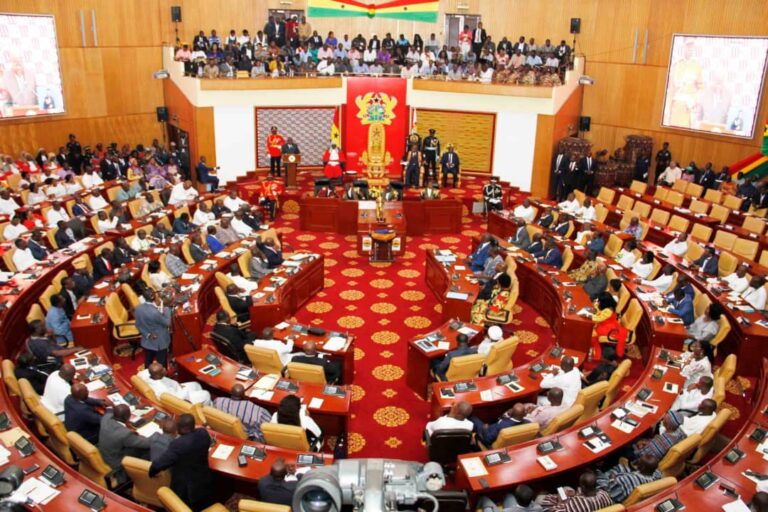Parliament has passed the National Pensions (Amendment) Bill, 2021. The object of the bill is to exclude the Police Service, the Immigration Service, the Prisons Service, the security and intelligence agencies and the Ghana National Fire Service from the unification pensions.
The bill seeks to amend the National Pensions Act, 2008 (Act 766) to exclude the security services from the pension unification process envisaged under section 213 of Act 766.
If assented to by the President, the bill will exclude the security agencies from the unification of the process to pave the way for establishing a separate regime to govern pensions in the security and intelligence sector.
The bill was presented to Parliament and read for the first time on December 10, 2021, by the Minister of Employment and Labour Relations.
The bill was referred to the Committee on Employment, Social Welfare and State Enterprises for consideration and report.
Observations
Per a report, the committee was informed that subsection (2) of section 213 of Act 766 mandated the board of the National Pensions Regulatory Authority (NPRA) to ensure the unification of all pension schemes and the full operationalisation of the three-tier pension scheme for all public sector workers, excluding the Ghana Armed Forces.
The committee noted that the Ministry of Employment and Labour Relations established a Joint technical committee on the unification of pensions to develop the required technical instruments for the unification process.
The committee, the report said, noted that although officers in the Police Service, Immigration Service, National Fire Service, Prisons Service, and other security and intelligence agencies faced the same or similar risks just as their counterparts in the Ghana Armed Forces, they were not excluded from the pension unification process and were treated the same way as other public sector workers.
“The committee was informed that an attempt at the unification of pensions during the payment of lump-sum benefits to the first batch of retirees from the security services under Tier 2 of the Three-Tier Pension Scheme in 2020 was fraught with massive employee data verification challenges, which stalled the entire unification process.
“As a result of the challenges that emerged during the pension unification exercise and the unique nature of the security services in general, the Employment Ministry recommended excluding the security agencies from the unification process to pave the way for establishing a separate regime to govern pensions in the security and intelligence sector,” it said.
Reinstatement
Per the report, the committee observed that the amendment would automatically reinstate the previous occupational pension schemes of the security services under CAP 30, which was the source of inequities in the delivery of pensions in Ghana. They, therefore, seek to reinstate the enactment and schemes which ceased to be in force under Act 766.
It named them as the Ghana Police Pensions Act, 1985 (PNDCL 165), Immigration Service Pensions Act, 1986 (P.N.D.C.L. 226), Prisons Service Pensions Act, 1987 (P.N.D.C.L. 168), Section 34 of the Security and Intelligence Agencies Act, 1996 (Act 526); and Section 27 of the National Fire Service Act, 2000 (Act 537).
Background
In 2004, a Presidential Commission on pensions was established to examine existing pension schemes in Ghana and recommend a sustainable pension scheme that would ensure retirement income security for the Ghanaian worker.
The establishment of the commission was occasioned by agitations within the labour front concerning identified inequalities and disparities within the pension regime for public sector workers.
Under the same public sector employer, some people were contributing to the pension scheme while others were not contributing.
The commission also conducted an actuarial valuation of the Pensions Ordinance No. 42 of 1950 (CAP 30) pension scheme to ascertain its impact on the Consolidated Fund.
The actuarial assessment conducted by the 2004 Presidential Commission on Pensions proved that the CAP 30 was unsustainable, inequitable, and exerting tremendous pressure on the Consolidated Fund.
The 2004 Presidential Commission on pensions, therefore, recommended that the CAP 30 be phased out.
The acceptance by the government of the proposed reforms culminated in the enactment of the National Pensions Act, 2008 (Act 766), which introduced the Three-Tier Pension Scheme and established the National Pensions Regulatory Authority as the main vehicle for enforcement.
The object of the Act 766 was to provide pension benefits to ensure retirement income security for workers, ensure that every worker receives retirement and related benefits as and when due, and establish a uniform set of rules, regulations, and standards for the administration of pensions and related benefits for workers in the public and private sectors.
Subsection (2) of section 213 of Act 766 mandates the board of the NPRA to ensure that pension schemes in the country are unified in accordance with Regulations made under the Act within four years after the commencement of the Act.
The government was expected to institute measures to migrate beneficiaries of the associated public pension schemes onto the Three-Tier Pension Scheme by the expiration of the transitional period in 2014.
However, by January 1, 2015, the government had not put in place adequate measures for the unification of public sector pensions.
Source: graphic.com.gh




